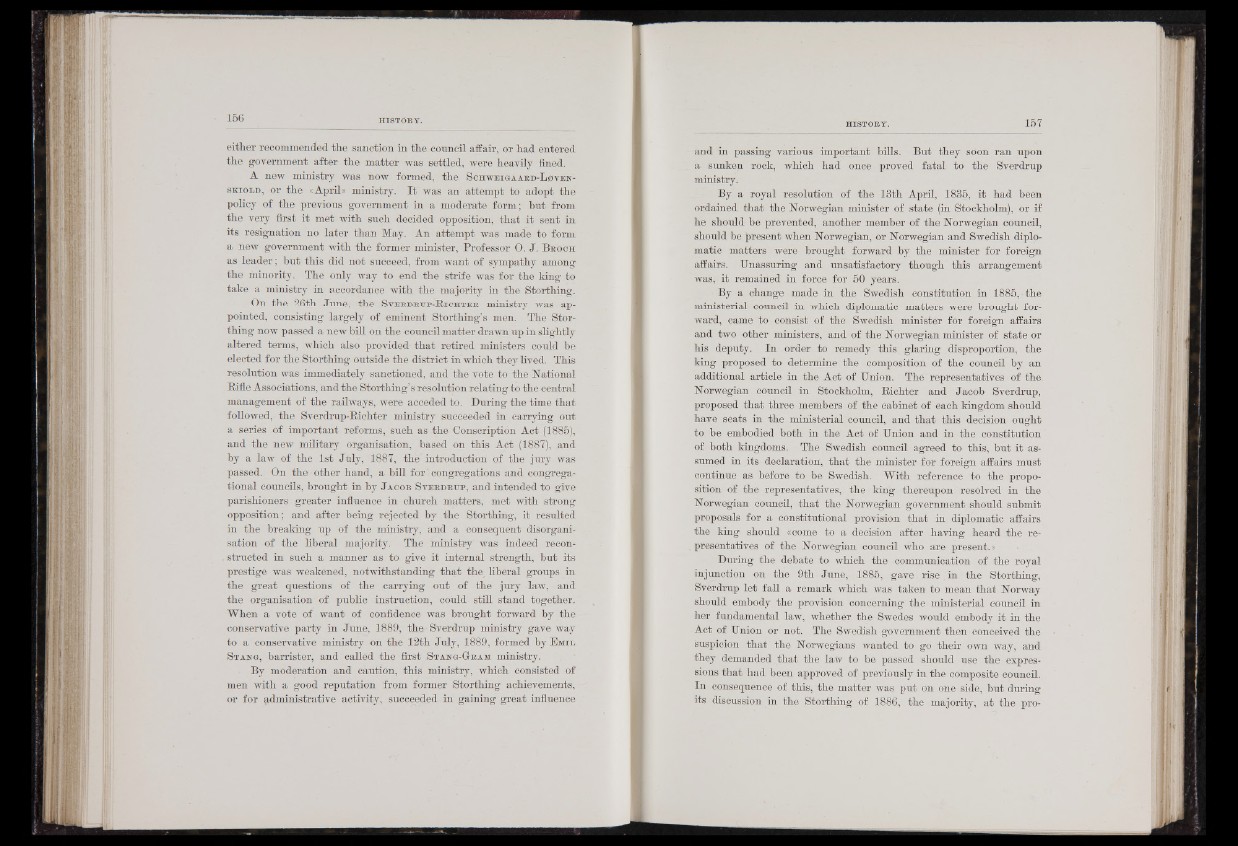
either recommended the sanction in the council affair, or had entered
the government after the matter was settled, were heavily fined.
A new ministry was now formed, the S c h w e ig a a r d - L o v e n -
SK ioL D , or the «April» ministry. I t was an attempt to adopt the
policy of the previous government in a moderate form; but from
the very first it met with such decided opposition, that it sent in
its resignation no later than May. An attempt was made to form
a new government with the former minister, Professor O. J. B b o c h
as leader; but this did not succeed, from want of sympathy among
the minority. The only way to end the strife was for the king to
take a ministry in accordance with the majority in the Storthing.
On the 26th June, the S v e r d b u p - R i c h t e b ministry was appointed,
consisting largely of eminent Storthing’s men. The Storthing
now passed a new bill on the council matter drawn up in slightly
altered terms, which also provided that retired ministers could be
elected for the Storthing outside the district in which they lived. This
resolution was immediately sanctioned, and the vote to the National
Rifle Associations, and the Storthing’s resolution relating to the central
management of the railways, were acceded to. During the time that
followed, the Sverdrup-Richter ministry succeeded in carrying out
a series of important reforms, such as the Conscription Act (1885),
and the new military organisation, based on this Act (1887), and
by a law of the 1st July, 1887, the introduction of the jury was
passed. On the other hand, a bill for'congregations and congregational
councils, brought in by J a c o b S v e b d r u p , and intended to give
parishioners greater influence in church matters, met with strong
opposition; and after being rejected by the Storthing, it resulted
in the breaking up of the ministry, and a consequent disorganisation
of the liberal majority. The ministry was indeed reconstructed
in such a manner as to give it internal strength, but its
prestige was weakened, notwithstanding that the_ liberal groups in
the great questions of the carrying out of the jury law, and
the organisation of public instruction, could still stand together.
When a vote of want of confidence was brought forward by the
conservative party in June, 1889, the Sverdrup ministry gave way
to a conservative ministry on the 12th July, 1889, formed by E m i l .
S t a e g , barrister, and called the first S t a b g -G-b a m ministry.
By moderation and caution, this ministry, which consisted of
men with a good reputation from former Storthing achievements,
or for administrative activity, succeeded in gaining great influence
and in passing various important bills. But they soon ran upon
a sunken rock, which had once proved fatal to the Sverdrup
ministry.
By a royal resolution of the 13th April, 1835, it had been
ordained that the Norwegian minister of state (in Stockholm), or if
he should be prevented, another member of the Norwegian council,
should be present when Norwegian, or Norwegian and Swedish diplomatic
matters were brought forward by the minister for foreign
affairs. TTnassuring and unsatisfactory though this arrangement
was, it remained in force for 50 years.
By a change made in the Swedish constitution in 1885, the
ministerial council in which diplomatic matters were brought forward,
came to consist of the Swedish minister for foreign affairs
and two other ministers, and of the Norwegian minister of state or
his deputy. In order to remedy this glaring disproportion, the
king proposed to determine the composition of the council by an
additional article in the Act of Union. The representatives of the
Norwegian council in Stockholm, Richter and Jacob Sverdrup,
proposed that three members of the cabinet of each kingdom should
have seats in the ministerial council, and that this decision ought
to be embodied both in the Act of Union and in the constitution
of both kingdoms. The Swedish council agreed to this, but it assumed
in its declaration, that the minister for foreign affairs must
continue as before to be Swedish. With reference to the proposition
of the representatives, the king thereupon resolved in the
Norwegian council, that the Norwegian government should submit
proposals for a constitutional provision that in diplomatic affairs
the king should «come to a decision after having heard the representatives
of the Norwegian council who are present.»
During the debate to which the communication of the royal
injunction on the 9th June, 1885, gave rise in the Storthing,
Sverdrup let fall a remark which was taken to mean that Norway
should embody the provision concerning the ministerial council in
her fundamental law, whether the Swedes would embody it in the
Act of- Union or not. The Swedish government then conceived the
suspicion that the Norwegians wanted to go their own way, and
they demanded that the law to be passed should use the expressions
that had been approved of previously in the composite council.
In consequence of this, the matter was put on one side, but during
its discussion in the Storthing of 1886, the majority, at the pro